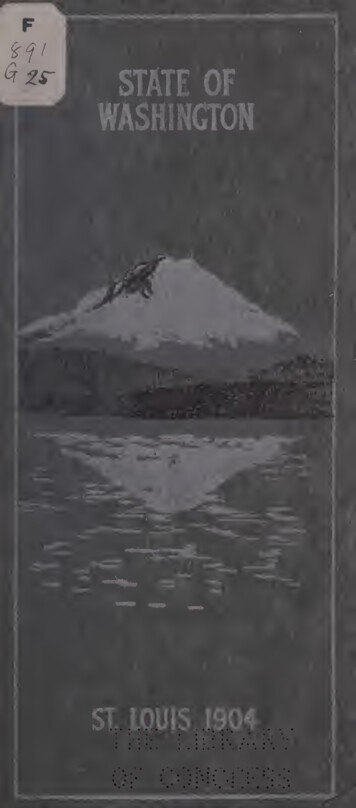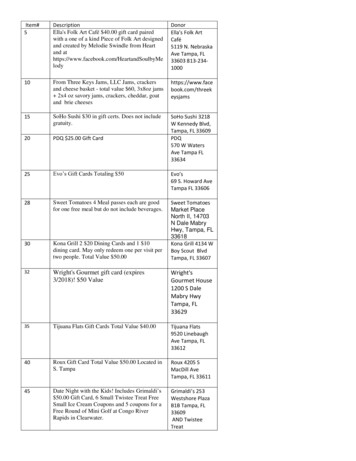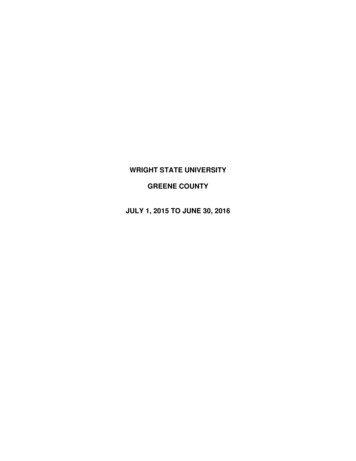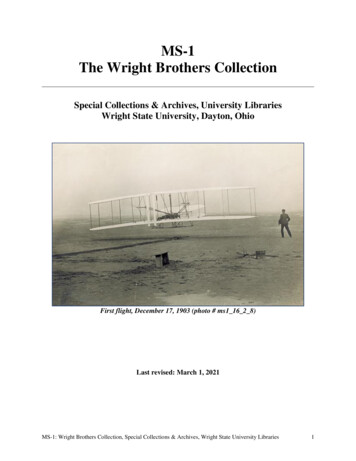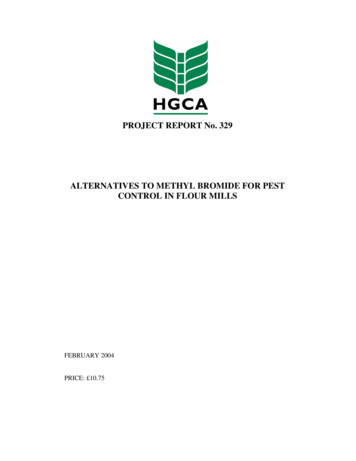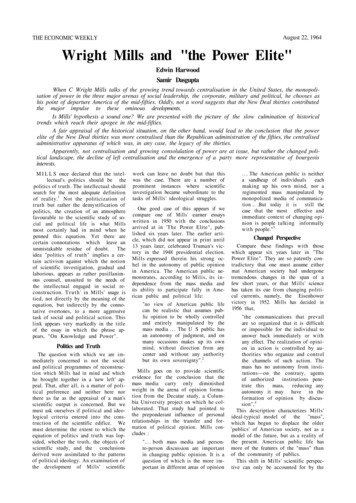
Transcription
August 22, 1964THE ECONOMIC WEEKLYWright Mills and "the Power Elite"Edwin HarwoodSamir DasguptaWhen C Wright Mills talks of the growing trend towards centralisation in the United States, the monopolisation of power in the three major arenas of social leadership, the corporate, military and political, he chooses ashis point of departure America of the mid-fifties. Oddly, not a word suggests that the New Deal thirties contributedthe major impulse to these ominous developments.Is Mills' hypothesis a sound one? We are presented with the picture of the slow culmination of historicaltrends which reach their apogee in the mid-fifties.A fair appraisal of the historical situation, on the other hand, would lead to the conclusion that the powerelite of the New Deal thirties was more centralised than the Republican administration of the fifties, the centralisedadministrative apparatus of which was, in any case, the legacy of the thirties.Apparently, not centralisation and growing consolulation of power are at issue, but rather the changed political landscape, the decline of left centralisation and the emergence of a party more representative of bourgeoisinterests.M I L L S once declared that the intellectual's politics should be thepolitics of truth. The intellectual shouldsearch for the most adequate definitionof reality. 1 Not the politicization oftruth but rather the demystification ofpolitics, the creation of an atmospherefavourable to the scientific study of social and political life is what Millsmost certainly had in mind when hepenned this equation. Yet there arecertain connotations which leave anunmistakable residue of doubt. Theidea ''politics of truth" implies a certain activism against which the notionof scientific investigation, gradual andlaborious, appears as rather pusillanimous counsel, unsuited to the needs ofthe intellectual engaged in social reconstruction. T r u t h ' in Mills' usage istied, not directly by the meaning of theequation, but indirectly by the connotative overtones, to a more aggressivetask of social and political action. Thislink appears very markedly in the titleof the essay in which the phrase appears, "On Knowledge and Power".Politics and TruthThe question with which we are immediately concerned is not the socialand political programmes of reconstruction which Mills had in mind and whichhe brought together in a 'new left' appeal. That, after all, is a matter of political preference and neither here northere as far as the appraisal of a man'sscientific output is concerned. But wemust ask ourselves if political and ideological criteria entered into the construction of the scientific edifice. Wemust determine the extent to which theequation of politics and truth was lopsided, whether the truth, the objects ofscientific study, and the conclusionsderived were assimilated to the patternsof political ideology. An examination ofthe development of Mills' scientificwork can leave no doubt but that thiswas the case. There are a number ofprominent instances where scientificinvestigation became subordinate to thetasks of Mills' ideological struggles.One good case of this appears if wecompare one of Mills' earner essayswritten in 1950 with the conclusionsarrived at in 'The Power Elite", published six years later. The earlier article, which did not appear in print until13 years later, celebrated Truman's victory in the 1948 presidential election.Mills expressed therein his strong ochel in the autonomy of public opinionin America. The American public uemonstrates, according to Milis, its independence from the mass media andits ability to participate fully in American public and political life:"no view of American public lifecan be realistic that assumes public opinion to be wholly controlledand entirely manipulated by themass media . . . The U S public hasan autonomy of judgment, and onmany occasions makes up its ownmind, without direction from anycenter and without any authoritybut its own sovereignty".2Mills goes on to provide scientificevidence for the conclusion that themass media carry only diminishedweight in the arena of opinion formation from the Decatur study, a Columbia University project on which he collaborated. That study had pointed tothe preponderant influence of personalrelationships in the transfer and formation of political opinion. Mills concludes :" . . . both mass media and personto-person discussion are importantin changing public opinion. It is aquestion of which is the more important in different areas of opinion. . . The American public is neithera sandheap of individualseachmaking up his own mind, nor aregimented mass manipulated bymonopolized media of communication . .But today it isstill thecase that the most effective andimmediate context of changing opinion is people talking informallywith people."3Changed PerspectiveCompare these findings with thosewhich appear six years later in "ThePower Elite". They are so patently contradictory that one must assume eithermat American society had undergonetremendous changes in the span of afew short years, or that Mills' sciencehas taken its cue from changing political currents, namely, the Eisenhowervictory in 1952. Mills has decided in1956 that,"the communications that prevailare so organized that it is difficultor impossible for the individual toanswer back immediately or withany effect. The realization of opinion in action is controlled by authorities who organize and controlthe channels of such action. Themass has no autonomy from institutions—on the contrary, agentsof authorizedinstitutions penetrate thismass,reducing anyautonomy it may have in theformation of opinion by discussion", 4This description characterizes Mills'ideal-typical model of the "mass",which has begun to displace the older'publics' of American society, not as amodel of the future, but as a reality ofthe present. American public life hasmore of the features of the "mass" thanof the community of publics.This shift in Mills' scientific perspective can only be accounted for by the
August 22, 1964 THE ECONOMIC WEEKLY
August 22, 1964THE ECONOMIC WEEKLYchanges in the political fortunes of theDemocratic Party, the Fair Deal andNew Deal offshoots of which Hills hadallied himself with and actively supported. How, in the face of. rising educational and cultural standards, couldso radical a change in America's socialstructure be accounted for otherwise?When Mills talks to us about the growing trends towards centralization, themonopolization of power in the threemajor arenas of social leadership, thecorporate, military and political, Millschooses as his point of departure America of the mid-fifties. Oddly, not aword, not a phrase, would suggest thatthe New Deal thirties contributed themajor impulse to these ominous developments. But this is not at all strangewhen it is considered that Mills was aprotege of the New and Fair Deal programmes and in turn repaid the debtby exempting these programmes andthe 'elites' which sponsored them fromhis critique.Legacy of the 'ThirtiesIs his hypothesis a sound one? Weare presented with the picture of theslow culmination of historical trendswhich reach their apogee in the midfifties. A fair appraisal of the historicalsituation would certainly lead to theconclusion that the power elite of theNew Deal thirties was more centralizedthan the Republican administration ofthe fifties, the centralized administrative apparatus of which was, in anycase, the legacy of the thirties. Remember: it was Roosevelt who attempted to stack the Supreme Court withadditional members in order to insurethe constitutionality of his legislation;it was Roosevelt who initiated the firstmajor incursions upon economic powerin the United States. It was the Republican administration which attempted to loosen the control of federal organs over economic life. Mills is veryselective in the kind of centralizationhe objects to. We have no doubt that hewould sanction socialist economic organization if it were undertaken in thename of "the people"; his writings pointclearly in this direction.With the exception of the militarywhich was not a prominent force in the1930s for obvious reasons relating tothe international position of the UnitedStates, the governmental apparatus ofthe 1930's was much more highly centralized than in the fifties and, in itsdesire to gain preponderant influenceover the judiciary and legislature onthe one hand, and the economic dynasties on the other, had, if we may borrow a communist inspired epithet, 'social-fascistic' aspirations. Mills paints aroseate picture of all ofthis, andmakes it appear as though the Leviathan awakes after the 1952 electoraltally. The rancorous rhetoric whichpervades "The Power Elite" is tied toa historical theory which chafes at itsharness. Not centralization and all ofthis business about the growing consolidation of power is at issue, but ratherthe changed politicallandscape, thedecline of left centralization and theemergence of a party more representative of bourgeois interests.Idealised PictureAnother example of Mills' 'science'is the idealized picture of 19th century American society, presented as acontrast to the power pyramiding ofcontemporary institutions. Mills reportsthat the 'Jeffersonian scatter' and faceto-face publics of that earlier era afforded a much greater opportunity tothe average citizen to participate inpolitical decision making. The politicaldomination unalloyed which Mills depicts for us in an early study is assumed to apply to twentieth century economic organizations. These royalists ofcapitalism have taken possession of thepolitical organs of local communities.5There are, however, a number of detailed empirical studies of local community power and historical trends inthe composition of that power whichappear to negate Mills' hypothesis and,in fact, argue the contrary. Rather, itis in the 19th century that economicdomination of local community politicsappears to have been most pronounced.This conclusion finds support in thework of Robert Dahi, Robert Schulze,Clelland and Form and others.6 In hisstudy of the New Haven 'power elite'Dahl finds the growth of "dispersedinequalities" as over against the monolithic organization of social influencewhich prevailed in the 19thcenturyand which was tied to economic power.These hierarchies of 'dispersed inequality' represent the pluralization ofpower and the emergence of contendingfactions, professional politicians on theone hand, and on the other the economic managerial elite and social notables. Edward Banfield found the noticeable absence of economic interests inthe civic controversies of Chicago. Heeven goes so far as to conclude thatthe failure on the part of the dominanteconomic overlords to interest themselves in local politics may have negative consequences from the standpoint of a balanced community democracy.7 These studies ofcommunitypower should be compared with Mills'work in order that a more balanced appraisal of American civic life may beobtained. Notwithstanding their manifold defects, they present themoreempirical side of political sociologicalwork in the United States.8No EvidenceThese studies, in addition to undermining the generalizations which Millsputs forth in regard to 19th centuryAmerican democracy, also attack theproblem of scientific investigation in adirect way, by examining the actualarenas of decision making, the contextof power as il becomes manifested incivic controversies. Mills rarely observesthe direct use of power and the flowof social influence. He assumes thatcertain contours exist on the basis ofdata relating to the political perceptions of the samples he investigates andthe social background data on the individuals in the social strata under examination. Social background and mobility data allow of no scientific judgment of such sweeping claims as thefollowing one, which appeared in anearly study:" . . . the small businessmen,cially in cities dominated bylarge industrial firms, areoften fronts' for the largerness powers.espea fewquitebusi-"The organizationof the SmallBusiness Front is quite often inthe hands of the Chamber of Commerce; and many of the hiddenwires behind the scene are manipulated by the local bank setup,which is usually able to keep theFront in line wheneverthis isconsidered necessary by large industrial firms." 9This claim may be true; it may befalse. No evidence is offered in theessay which would allow for some judgment. A good deal more is hidden thanjust the 'behind-the-scenes' wires it appears. Mills' crusadingepithets lackempirical substance andfoundations,and Daniel Bell's observation that Mills"takes statistic after statistic andclothes them with angry metaphors"really misses the mark. 10 The angrymetaphors clothe theoretical generalizations which often have no intrinsicrelationship to the statistical data.Consider one other of the not inconsiderable number of sweeping generalizations which emerge from "The PowerElite". The 'Big Three' Mills claims,the corporate, state and military elites,are increasingly 'shaping' the educational, religious and familial institutions.Let us designate these latter the 'dependent three.' But the question naturally arises: Shaped in what way? Somehypothetical derivations about the con1391
THEECONOMICAugust 22, 1964WEEKLYcrete nature of this flow of influencewould be expected if the study werescientific. Anyone familiar with currentdemographic tendencies in the new nations realizes that the explosive growthrates have major implications for theBig Three—not just major implicationsbut revolutionary ones. Since procreation is certainly a 'family affair' andsince these explosive rates of growthmay have far more impact on the socialand political structures of these nationsthan the latter will have on these ratesof growth, it may be claimed that oneof the 'dependent three', the family, isshaping Mills' Big Three. The test ofpower has still proven unfavourable tothe power elites of those states whichhave attempted to curb fertility. Wemention this example only to illustratethe difficulty involved in sweeping generalizations about the flow of socialcause and effect. On this point Millshas departed from his 'plain Marxian'orientation because that orientation hasalways pointed—and with indubitablevalidity—to the fact that major socialrevolutions (violent andnon-violent)come 'from below'.These and otherrelatedinconsistencies andinadequacies in Mills'scientific work stem from the repeatedinterference of political considerationsin the scientific blueprint. A hard indictment? The evidence is there foreveryone to view for himself. It isone thing to permit ideology to determine the topics of research—withthis kind of intrusion none can argue.It is quite another thing to let ideology guide the research operations andgeneralizations arrived at. Mills' articlesand obiter dictaonscientificcraftsmanship notwithstanding, we believe that this indictment stands.IIMills and MarxismMills has describedhimself as a'plain Marxist'. This implies muchmore than the recognition of the valueof the Marxist theory of history andsocialorganization,arecognitiongranted generously by social and economic thinkers who are politically conservative. Indeed, the Marxist scaffolding has been retained as an analytictool by some who, like Joseph Schumpeter, were never sympathetic to theMarxist political struggle. Recognitionof the value of the Marxian approachto history, or even the useof thatframework in concrete scientific work,are not alone sufficient to warrant theappellation. Rather it is the sympathyof a political and moral kind for theleft wing swing ofhistory—perhapsmore broadly conceived than allegianceto the twenty-one conditions of theComintern—in combination with theuse of Marxist categories of analysiswhich justifies Mills' self-designation.Populist ConceptionThe use of the adjective 'plain' ischaracteristic of Mills. It underscoreshis individualistic political style andpopulist conception of the ideal political order. With him it meansthatwhere political dogma isconcerned,flexibility is more suitable, and whereorganizational loyalty and obedienceare required, an individualistic rebuffmay be expected. It means to be electic where theoretical construction is involved. Where practical politics is concerned, it means to be in the spirit ofrevolt, and not in the ranks of theaparatchiki.The antipathy towards moralistic—Marx would have said "Utopian"—programmes of social action which lack afoundation in theoretical understandingof historical possibilities is probably theclearest and strongest link betweenMills and Marx. Mills fulminated against the kind of scientific researchwhich he felt characterized most ofthe important currents of American sociology, that which focused on delimited "milieux" and therefore lacked abroader historical perspective. Theroots of scientific thinking should notarise from moral and emotional impulsebut from the broader theoretical undertaking. It is this scientific realismwhich links Mills to the Marxist tradition, and, as far as American socialscience is concerned, would make himappear as the representative of thattradition in the United States.Mills' favourable reception in Marxist circles, in particularamong theyoung intellectuals of the new nations,is the result not of methodological orthodoxy in the use of Marxian theoretical categories—which Mills used veryloosely and mixed in with the blueprints of bourgeois social scientists—but rather of his left-wing sympathies,and his virulent criticism of capitalisteconomic power and American foreignpolicy, or, as Marxists would say, ofAmerican neocolonialism. In any case,it would be most difficult to describeMills' approach as Marxist as far astheory is concerned. His system wasnever a closed one as was Marx's in thesense of a closely interrelated body ofpropositions linking economic forces tosocial and political processes. Mills received from Marx the tools of classanalysis but even here his notion ofclass is closer to Weber's. Mills' determination of who constitutes the 'elite'and who the 'mass' depends on thesocial interests, the possession of formal institutional positions, and the social background of a stratum, not onthe formal relations to the means ofproduction. For Mills, to give one concrete example, it is much more important to discover that high ranking officers and civil servants attended thesame elite schools and join the samesocial clubs than to find that they ownproperty. Since most members of thesestrata do not have considerable 'material' interests in that sense, their bondwith the corporate elite must be soughtin another direction. This is why theWeberian definition ofsocialclass(status) served Mills much better thanthe economic definition of class as defined by Marx.Antipathy to CapitalismFrom Veblen Mills gained, in additionto a passionate rhetoric, thepopulists naturalantipathy to theeffetecivilization ofcapitalism, itssuperfluous commodity production andthe superfluous stratum which managedthe economic engine.11 But it is generally conceded that the most importantformative influence came from Weber;Mills' central problem, the bureaucratization of contemporary society, haddominated Weber's thinking during thelast years of the latter's life. The problem of the social control of monolithic power is clearly not a Marxist conceptualization, since it leads to theimplicit recognition that the important impulses in modern life come from'above.' From the standpoint of orthodox Marxists—whatever their orientation in terms of practice, whichisusually a clear recognition of the impact of political power—this was amajor heresy. If history moves 'frombelow' then the political instrumentalities of a given class, however cohesive,cannot alter the fundamental contoursof development. But Mills suggests theexact opposite. Of course, whether youcare to include Mills in the Marxisttradition or not depends very muchupon how the boundaries are delimited.Marx did not emphasize elite vanguards,but Lenin did and Lenin's ideology ofpractice is compatible with Mills' position, if not with respect to methods, atleast as regards the social stratum bestsuited to undertake social change.The well known American Marxist,Herbert Aptheker, accusedMills offailing to determine the ultimate locusof social power in his tri-partite division of the power elite, that is, of failing to note that in any final test ofstrength, real power must lie with thecorporate dynasties.12 But the fact ofthe matter is, Mills does suggest that1393
August 22, 1964THE ECONOMIC WEEKLY
THE ECONOMIC WEEKLYwhiLe the power elite is not merely theexecutive committee of bourgeois, corporate power, it is true that the corporate interests have relatively morepower than either the state or the military. The unidimensional flow of poweris difficult to observe primarily becausethe moral climate creates a 'natural'alliance of interests and outlook. Thisis partly the product of similarities insocial background, and of the recruitment of government personnel fromthe ranks of industry. A moral consensus favourable to business interests hasthe same ultimateconsequences aswould format political powerin thehands of the corporate elite—indeed,it is much better because much moreconducive to a smooth operation of thegovernmental apparatus.But for allthat the reservoir of power in thehands of the industrial bourgeoisie remains. Mills strongly suggests this ina number of articles.13 Consider thefollowing:"For by now everybody, definitelyincluding Big Business, knows thatwe must speak of the political andthe economic in one breath, of apolitical economy. This means, inanother set of terms, that 'business'and 'government' aremore andmore becoming one.That their'conflict.' has been institutionalizedwithout the benefit of Congress.It: means that 'business' can andwell may become 'government.'" . As government and businessbecome increasinglyinterlocked,economic questions will more andmore become: who is to staff thepoints of political decision in thegovernmental hierarchies and pinnacles?.today'thepoliticalfreedom of free enterprise' meansthe power of Corporationsoverand within the State."14'PoliticalCapitalists'Even in the case where the politicalelite recruits primarily from non-capitalist strata and Mills' theory about theeffect of social backgrounds on political interests would appear tobreakdown, we find Mills asserting that thesepolitical parvenues willbecome 'coopted' into the traditional elites of notables and property holders.In otherwords, capitalist interests will be served whatever the electoral outcome. Thisthesis is worked out by Mills in collaboration with H H Gerth for the caseof Nazi Germany.15 Therapprochement between the petty bourgeoisie andthe agrarian and industrial capitalists isachieved by allowing prominent members of the Nazi hierarchy to gain possession of capital, to become capitalists.August 22, 1964themselves. They become what Millsand Gerth term 'political capitalists'.This thesis goes against the propositional logic of Marxist theory in its tacitrecognition of the importance of purepolitical power for the acquisition ofeconomic power.Butsince Millsa sser tsthepreponderanceofeconomic power in theinstitutionaltriumvirate, at least in the long run,Aptheker's criticism would appear tobe beside the point.To be sure, othersimilarities between Mills' model and Marx's appear.Both employ a kind ofpolarizationhypothesis which assumes the historicalgrowth of a gap between the powerfuland the powerless.With Mills theantipodal social forces resolve themselves into 'elitestrata' on the onehand, and the 'masses' on the other;with Marx.pauperizedproletariansover against the remaining groups ofcapitalists who have survived the competition of accumulation. Since, as wenoted above, Mills' gives preponderantemphasis to the force of capital for theinrerests of the power elite, it mightbe concluded that the two models donot differ radically, at least, on fundamentals. Butownership of capitalcould not possibly serve as the definingcriterion of membership in Mills'model.Into the'mass' fallsmallbusinessmen,farmers,professionalsalong with proletarians and celebrities.Membership in the elite does not require property. In the United Statesmilitaryand civilserviceofficialsqualify as members of the power elite.They are not capitalists if by that wemean owners of the means of production. 16Yet they might certainly besaid to serve the interests of corporatepower at least, according to Mills thesis—as well and veryprobably betterthan strata which are technically capitalistic, farmers, small businessmen andthe like whose antipathy to centralizedcorporate power is a well known fact.Further, thehistorical dynamicsinvolved in Mills' polarization lack thetechnical economic foundations whichMarxprovidedfor his model. ForMills, as for Weber, this was more orless an accomplished fact, the productof a variety of causes,technologicaland organizational rationalization beingthe most significant. Marx's laws ofprimitive accumulation and the processof intra-capitalist expropriation are notto be found within Mills' framework.In summary. Mills' modified Marxismamounts to a sympathyfor leftwingmovements and principles plus the useof class categories in social analysis.But the body of amorphous h to and vision of the historicalprocess is no more Marxian than it isWeberian or Veblenian It is a composite of these and other patterns ofthought.Notes1C Wright Mills, Onknowledgeand Power,' in "Power, Politicsand People," (ed) Irving L Horowitz, New York, Ballantine Books,1963, p 611.2Mills, 'Mass MediaandPublicOpinion,' in "Power, Politics andPeople", pp 577-578.3Ibid, p 586.4Mills, "The PowerElite",NewYork, Oxford University Press,1959, p 304.5Mills, 'TheMiddle Classes inMiddle-sized Cities', in "Power,Politics and People", pp 274-291.6Robert. O Schulze, 'The Bifurcation of Power in a Satellite City',in "Community Political Systems",(ed) Morris Janowitz, Glencoe, TheFree Press, 1961, pp 19-80. RobertA Dahl ,"Who Governs?", NewHaven. Yale University Press.1962. Donald A Clelland and W i l liam H Form. "Economic Determinants and Community Power: AComparative Analysis". AmericanJournal of Sociology, March, 1964.7Edward C Banfield, "Political Influence", New York, the Free Pressof Glencoe, 1962.8A good discussion of the problemsinvolved in the analysis of the flowof power and influence can befound in Morris Janowiiz's "Community Power and 'Policy Science'Research," in The Public OpinionQuarterly, 26, (Fall. 1962), pp 398410.9Mills. "The Middle ClassesMiddle-sized Cities", ibid.in10Daniel Bell, 'Is There a Ruling Classin America', in "The End of Ideology". New York, Collier Books,1962, p 47.11Mills was not personally adverse tothe superfluous gadgetry of capitalism as his interest in and possession of racy sports autos and motorbikes demonstrates.See HarveySwados' delightful discussionofMills' personal life."C WrightMills: A Personal Memoir", Dissent, 10. Winter, 1963. pp 35-4212Herbert Aptheker. "Power in A m erica", Mainstream, 9, September1956, pp 1-16.1395
THEAugust 22, 196413141396Mills, 'Collectivism and the "Mixedup" Economy'; 'The Decline of theLeft', p 227; 'The Political Gargoyles: Business as Power', all in"Power. Politics and People".Mills. 'Collectivism and the "Mixed-up" Economy', Ibid, pp 185-186.Gerth, Hans H, and Mills, 'A Marxfor the Managers', in "Power,Politics and People".Mills found that a larger proportionof the political elite of the two de-ECONOMICWEEKLYcade span, 1933 through 1952,came from the lower classes thanfrom either the middle or upperclasses. 'The American PoliticalElite; A Collective Portrait*, in"Power, Politics and People" p 199.
Wright Mills and "the Power Elite" Edwin Harwood Samir Dasgupta When C Wright Mills talks of the growing trend towards centralisation in the United States, the monopoli sation of power in the three major arenas of social leadership, the corporate, military and political, he choo



